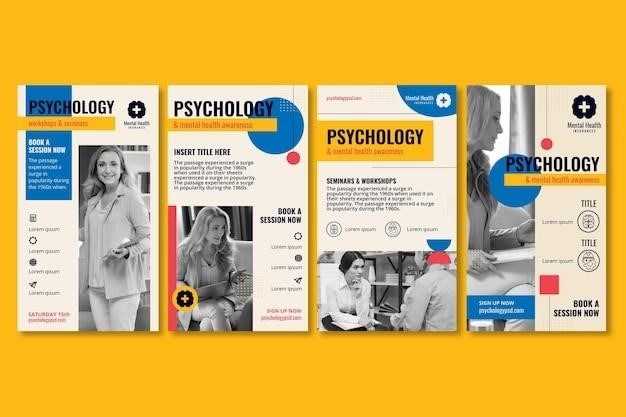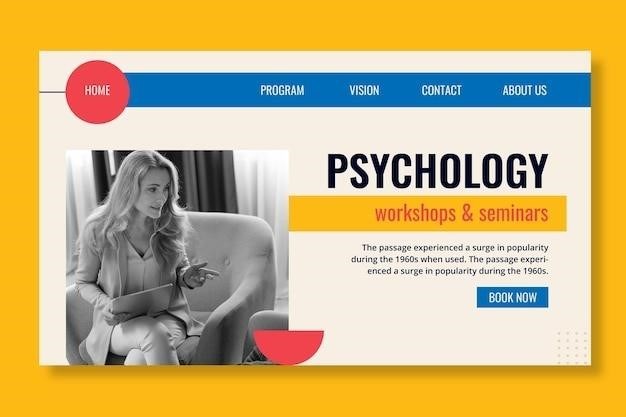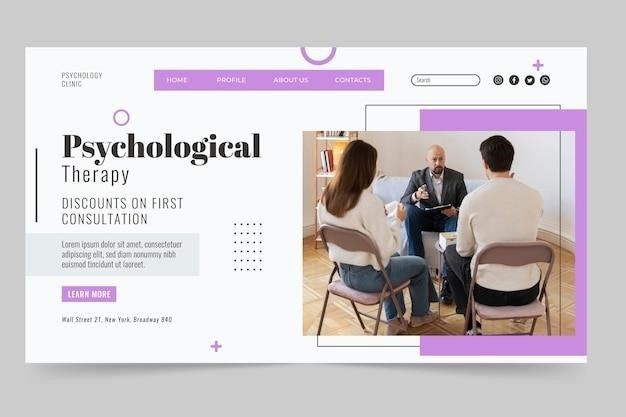
Exploring Psychology in Modules⁚ 12th Edition
The 12th edition of Myers and DeWall’s “Exploring Psychology” is now available in a modular format, dividing the content into easily digestible units, ideal for diverse learning styles; This updated version retains core concepts while incorporating new research and applications, fostering critical thinking and cultural understanding. The modular structure enhances readability and flexibility, making it a valuable resource for students and instructors alike.
Accessibility and Format
The 12th edition of “Exploring Psychology in Modules” prioritizes accessibility through its innovative modular design. Each module, averaging approximately 12 pages, presents concise, focused content, eliminating overwhelming length and promoting easier comprehension. This structure caters to diverse learning preferences and allows for flexible sequencing, enabling instructors to tailor the material to specific course needs. The brevity of each module makes it manageable for students to complete in a single sitting, enhancing engagement and retention. Furthermore, the text’s digital availability in formats like PDF expands accessibility, allowing students to access the material on various devices and at their convenience. This multifaceted approach to accessibility ensures a broader reach and a more inclusive learning experience.
Modular Structure and Readability
The modular structure of the 12th edition significantly enhances readability and comprehension. Breaking down the extensive subject matter into smaller, self-contained units prevents information overload and promotes focused learning. Each module tackles a specific concept or topic, allowing students to process information in digestible chunks, improving retention and reducing cognitive strain. The concise nature of each module facilitates efficient study sessions, encouraging regular engagement with the material. This approach contrasts with the potentially daunting task of tackling a large, unbroken textbook. The streamlined presentation fosters a more positive learning experience, encouraging students to actively participate in their understanding of psychology. The clear structure and concise writing style combine to create an accessible and engaging learning experience, facilitating deeper understanding.
Content Updates in the 12th Edition
The 12th edition boasts significant content updates reflecting the latest advancements in psychological research and theory. New findings in neuroscience, behavioral genetics, and cognitive psychology are integrated throughout the text, providing students with the most current understanding of the field. The emphasis on critical thinking remains central, encouraging students to analyze information and form their own informed opinions. The edition also enhances its coverage of cultural diversity and cross-cultural psychology, ensuring a more inclusive and globally relevant perspective. Real-world applications are highlighted, illustrating the practical relevance of psychological principles to everyday life. These updates ensure that students are equipped with the knowledge and skills necessary to navigate the complexities of human behavior in a rapidly evolving world. The integration of contemporary research strengthens the book’s value as a comprehensive and up-to-date resource for students of psychology.
Research Methods Focus
A significant strength of the 12th edition lies in its robust treatment of research methods. The text doesn’t merely present findings; it equips students with the critical thinking skills to evaluate the scientific basis of psychological claims. Detailed explanations of various research designs, from experimental to correlational studies, are provided, along with discussions of sampling techniques, data analysis, and the interpretation of results. Students learn to identify potential biases and limitations in research, fostering a nuanced understanding of the scientific process. The emphasis on research methodology isn’t confined to separate chapters; it’s woven throughout the text, illustrating how research informs our understanding of different psychological phenomena. This integrated approach ensures that students develop a strong foundation in evaluating psychological research, crucial for critical engagement with the field. The focus on research methods empowers students to become informed consumers and potential producers of psychological knowledge.
Applications and Real-World Relevance
The 12th edition excels in connecting psychological concepts to everyday life, bridging the gap between theoretical knowledge and practical application. Numerous real-world examples, case studies, and illustrative scenarios are integrated throughout the modules, demonstrating the relevance of psychology to various aspects of human experience. Topics range from effective workplace strategies and improved interpersonal relationships to informed decision-making and parenting skills. The text doesn’t just describe psychological phenomena; it shows how understanding these principles can lead to positive change in personal and professional lives. By highlighting the practical implications of psychological research, the 12th edition inspires students to apply what they learn, fostering a deeper understanding and appreciation of the field’s value beyond the academic setting. This focus on real-world applications makes the material engaging and memorable, enhancing learning and retention.

Finding the PDF⁚ Legal and Ethical Considerations
Accessing copyrighted material without authorization is illegal and unethical. Respect intellectual property rights; explore legitimate avenues for acquiring educational resources. Consider affordable alternatives or open educational resources (OER).
Copyright and Intellectual Property
The “Exploring Psychology in Modules, 12th Edition” textbook, like all published works, is protected by copyright law. Copyright is a legal right granted to the creators of original works, including authors and publishers. This protection extends to the text, images, and other intellectual property contained within the book. Distributing or sharing copyrighted material without permission infringes upon these rights and can lead to serious legal consequences for both the distributor and the recipient. The copyright holder retains exclusive rights to reproduce, distribute, display, or create derivative works from their creation. Unauthorized reproduction and distribution, especially in digital formats like PDFs, is a violation of copyright law and can result in significant financial penalties and legal action. Publishers invest substantial resources in creating and distributing textbooks, and copyright protection safeguards their investment and encourages further development of educational materials. Respecting copyright is essential for maintaining the integrity of the publishing industry and ensuring the availability of high-quality educational resources for students and educators.
Legitimate Access to Educational Materials
Accessing educational materials like “Exploring Psychology in Modules, 12th Edition,” should always be done through legitimate channels. This ensures that both students and educators obtain the legally authorized version of the text, complete with all intended content and features. Reputable methods for accessing the textbook include purchasing a new or used copy from the publisher, a bookstore, or online retailers. Many educational institutions offer course packs or ebook subscriptions providing legal access to required reading materials. Libraries also often hold copies of textbooks, making them accessible to students. Utilizing these official channels supports the creators and publishers who invested time and resources into producing the textbook. Furthermore, legitimate access guarantees that students receive the full benefit of the educational materials, including supplementary resources, potential online components, and any errata or updates. Choosing legal access methods contributes to a sustainable educational ecosystem and fosters ethical engagement with intellectual property.
Alternative Resources for Learning Psychology
While “Exploring Psychology in Modules, 12th Edition” offers a comprehensive approach, numerous alternative resources can supplement your learning journey. Open educational resources (OER) provide freely accessible learning materials, often covering core psychology concepts. These can include online textbooks, video lectures, and interactive exercises. Many universities and colleges offer podcasts and online courses, expanding learning opportunities beyond traditional textbooks. Khan Academy and Coursera, among other platforms, host psychology-related content, encompassing diverse topics and teaching styles. Furthermore, reputable psychology websites and journals can provide up-to-date research findings and insightful articles. Libraries offer access to a vast selection of books, journals, and databases focused on psychology. Utilizing a combination of these resources enables a more holistic and enriched understanding of the subject, catering to individual learning preferences and supplementing the information presented in the textbook. Remember to critically evaluate the credibility and accuracy of any resources used.
Open Educational Resources (OER)
Open Educational Resources (OER) offer a valuable alternative to traditional textbooks, providing freely accessible educational materials. These resources are particularly relevant for students seeking cost-effective learning solutions or those who prefer diverse learning styles. OER encompasses a wide range of materials, including online textbooks, interactive simulations, video lectures, and assessments, all available at no cost. Many OER initiatives focus on core psychology concepts, aligning with the content covered in “Exploring Psychology in Modules, 12th Edition,” and can serve as supplementary learning tools. The flexibility of OER allows for personalized learning paths, catering to individual needs and preferences. However, it’s crucial to evaluate the quality and credibility of OER materials, ensuring they align with academic standards and provide accurate information. While OER can be a valuable addition to your studies, they may not always replace the comprehensive coverage and structured presentation of a well-established textbook like Myers and DeWall’s work.
Potential Risks of Illegal Downloads
Downloading copyrighted material, such as “Exploring Psychology in Modules, 12th Edition,” without authorization carries significant legal and ethical risks. Downloading pirated PDFs exposes you to potential malware and viruses that can compromise your computer’s security and personal data. These illegally obtained files often contain malicious software designed to steal sensitive information or damage your system. Furthermore, engaging in copyright infringement can result in severe legal penalties, including hefty fines or lawsuits from publishers. Beyond the legal repercussions, accessing pirated materials undermines the academic publishing industry, impacting authors and educators who rely on sales revenue to support their work. Ethically, it’s crucial to respect intellectual property rights and contribute to a fair and sustainable academic ecosystem. Choosing legal and legitimate avenues for accessing educational resources ensures a secure and responsible approach to learning. Support the creators and publishers by purchasing or renting the materials legally.
